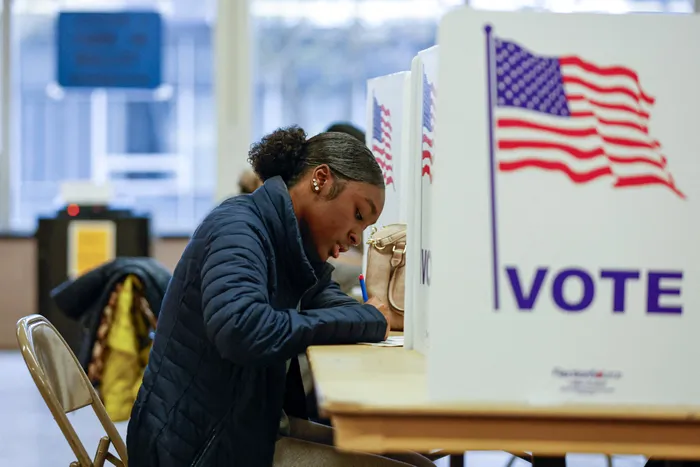‘No fundamental shift expected in Washington’s approach to Africa’

A woman casts her ballot during early voting for the US general election at a polling station at Ottawa Hills High School in Grand Rapids, Michigan, on November 3, 2024. Picture: Kamil Krzaczynski / AFP.
DR SIZO NKALA
DOES Africa have a stake in the outcomes of the upcoming US elections?
Although the US Vice President Kamala Harris and the former president Donald Trump, the Democratic and Republican parties’ presidential candidates respectively, have characteristically said little about Africa in their respective campaigns, there is a case to be made for the relevance of the outcomes of the November 5 plebiscite to Africa.
Despite Africa having a marginal position in Washington’s foreign policy considerations, the two parties have over the years forged a close relationship across the economic, development, security, cultural and diplomatic spheres whose trajectory will be determined by the results of the elections.
Successive US administrations have come up with various African initiatives that have bolstered the US-Africa relationship. Fuelled by the ‘trade not aid’ mantra, the Bill Clinton administration passed the Africa Growth and Opportunity Act (AGOA) in 2000 which grants selected African countries duty-free market access to the US. AGOA, which is due for renewal in 2025, saw eligible countries export goods worth US$10.3 billion in 2022 which was a little below the average of US$11.6 billion between 2011 and 2021.
George W Bush’s administration set up the Presidential Emergency Plan for Aids Relief (Pepfar) and the Millennium Challenge Corporation (MCC) from which African countries have benefitted significantly. Pepfar played an important role in fighting the HIV/AIDS pandemic in Africa through the provision of anti-retroviral drugs and other treatment and prevention materials. Since its commencement in 2004, the MCC programme has invested US$10 billion in 23 African countries across various sectors namely agriculture, healthcare, energy, transport and water supply and sanitation.
Former president Barack Obama inaugurated the US-Africa Summit which created a platform for deliberating on issues of common interest. Obama also launched the Power Africa initiative during his visit to Cape Town, South Africa, in 2013 which was aimed at increasing access to electricity in Sub-Saharan Africa.
To date, multiple energy projects have been started under the initiative namely the Nachtigal hydropower project in Cameroon set to generate 420MW of electricity, the Lake Turkana Wind Power project in Kenya with 310MW capacity, the 350MW Kpone Independent Power Plant in Ghana, and the 100MW Kaxu Solar One project in South Africa among others. Despite his infamous and crude characterization of African countries, the Donald Trump administration introduced the Prosper Africa initiative which sought to improve two-way trade and investment between Africa and the US by connecting the US and African businesses with buyers and suppliers.
The Prosper Africa initiative was a shift from the humanitarian and security-focused engagement of Africa to one based on sound economic footing consistent with Trump’s America-first policy. It was also meant to reverse the steep decline of US-Africa trade which decreased from a high of US$142 billion in 2008 to just US$64 billion in 2021.
Moreover, the US International Development Finance Corporation (IDFC) which was established in 2020 to provide finance to infrastructure and development projects in developing countries to further US strategic interests has provided about US$10 billion in funding for women empowerment, climate adaptation and mitigation, infrastructure and agricultural projects across Sub-Saharan Africa.
For his part, President Joe Biden revived the US-Africa Summit which was ignored by Donald Trump. His administration also adopted the US Strategy Towards Sub-Saharan Africa in 2022 which promised to improve cooperation in economic, technology and security sectors while also promoting democracy in Africa.
However, the rhetoric expressed in the strategy document has not been matched by action as Biden has ignored the continent which he has not visited since he got into the White House despite repeated promises to do so. His hastily arranged visit to Angola slated for December is a poor attempt to correct this omission which will hardly impress African leaders.
Although high-level US government officials including Secretary of State Anthony Blinken, Treasury Secretary Janet Yellen and Vice President Kamala Harris have criss-crossed the continent, these were not adequate substitutes for a presidential visit which symbolises mutual strategic importance, trust and solidarity.
It is unlikely that the incoming administration in Washington will prosecute any fundamental shift in US approach to Africa the majority of whose initiatives enjoy bipartisan support.
However, a second Trump presidency may see an emphasis on promoting trade and investment while toning down humanitarian, security and democracy programmes. Trump is not a fan of American global philanthropy and will opt for a more transactional relationship with Africa.
A Harris presidency will likely be a continuation of Biden’s policies which inherited the US piecemeal approach to Africa marked by a salad mix of humanitarian and development initiatives. Perhaps Harris would want to add her own Africa initiative like other presidents have done in the past.
With the war in Ukraine, growing tensions with China, and the raging Middle East conflict, Africa will continue to rank lowly in Harris’ foreign policy priorities. One of the major concerns for African leaders is both candidates’ positions on the renewal of AGOA whose current lifespan elapses in 2025.
However, having enjoyed bipartisan backing in the US Congress in the last 25 years, chances are high that either candidate will renew the scheme. This is not least because, if improved, AGOA has the potential to advance the US geostrategic interests in Africa.
* DR SIZO NKALA is a Research Fellow at the University of Johannesburg’s Centre for Africa-China Studies.
** The views expressed in this article do not necessarily reflect the views of The African.
Related Topics: